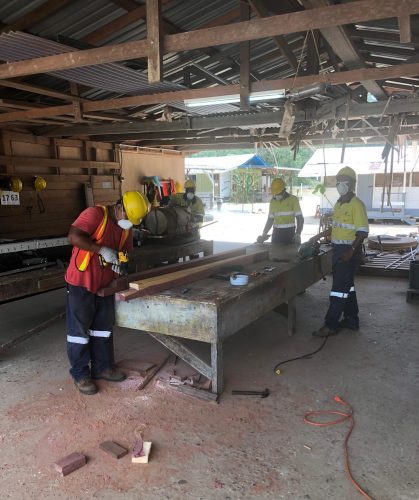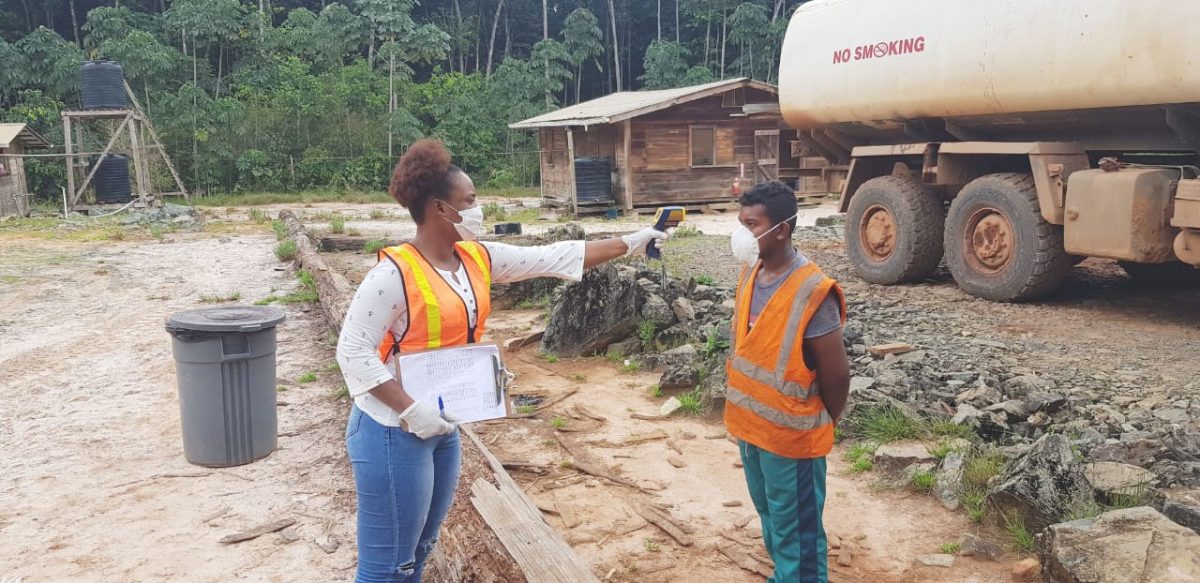Even with favourable markets, large scale mining of minerals here has suffered major setbacks due mainly to health restrictions put in place to prevent the spread of the novel coronavirus disease (COVID-19) and this has left hundreds without work.
However, some companies have adjusted their work schedules and have kept most of their employees on and continue to pay their wages and salaries as per normal.
“What we found out was that once COVID started, the [expatriates] from the large scale companies left Guyana and even those Guyanese who had dual citizenship left because they felt overseas they would have had access to better medical care. That was immediate and the impact felt was immediate,” Technical Officer for Mining in the Ministry of Natural Resources, Euliene Watson told Sunday Stabroek in an interview.

“Then earlier last month, the government designated mining as an essential service and the airports were closed. Some who had left and may have wanted to come back to work they could not because of the closure. The price of gold (per ounce is) over US$1700 currently so now would be the ideal time to work …but safety comes first,” she added.
The Ministry of Natural Resources’ mining officer said it is too early to state the magnitude of the impact the disease will have on overall gold, bauxite and manganese production this year.
However, she reminded that the bulk of gold production last year came from medium and small scale miners so to gauge annual production targets, a key factor would be how those miners perform.
For Guyana Goldfields Inc (GGI), the coronavirus has hit the company’s operations at Aurora, Region Seven adversely since the workforce for this year had been sustaining itself on open pit mining while it waited transition to underground mining and a takeover by fellow Canadian miner Silvercorp.
When COVID-19 restrictions were announced in March, the majority of the company’s expatriate management opted to return home. This meant that the entire operation had to be closed and locals forced to also go home and await a decision.
Senior Vice President of Strategy and Corporate Affairs Perry Holloway recently told this newspaper that the company was running out of gold in the open pit mine, making the operation unprofitable.
Only last week Tuesday, the company terminated the services of over 160 employees and it plans to continue to reduce its approximately 530-member workforce over the next few days.
“It was a sad day … because about 160 persons received their termination letters and at a time like this with COVID-19, it is even sadder,” a source at GGI had told this newspaper afterward.
“Some persons cried and it was just a sad atmosphere. Most persons were left questioning what they will do now because there are not many job opportunities and that is further complicated by this COVID,” the source added.
‘Rotation’
At Troy Resources, also located in Region Seven, General Manager Michael Rodrigues said that work continues as per normal but COVID-19 has impacted the rotation schedule of 300 employees on roll.
“The COVID-19 pandemic has caused a drastic shift in the length of the rotation period for local workers at Troy Resources from two weeks on site to six weeks per turnaround [and] three off,” he said.
“Troy Resources puts the health and safety of its workers at the forefront hence it has adopted very stringent safety and health precautions in addition to the new roster which sees a schedule of six weeks on site [with] three weeks off, instead of the usual two weeks on site and one week off. Among the other major changes is that the company has reduced the number of employees who work on site at any one time,” he added.
But so far, according to the company, its contract and permanent employees have responded positively to this change, given the likely alternatives and the significant threat that frequent travel brings.
Troy has been recovering from a shutdown which had been triggered by the death of a geologist on site.
Rodrigues reasoned that unlike other international operations, Troy Resources is heavily dependent on its largely local staff and has a limited number of foreign workers primarily in the technical and specialised skills fields.
“Since a large component of staff comes from the coastland and interior locations, the impact of travel restrictions across Guyana has affected their once regular movement to and from work and the time they spend with their families,” he said.
In addition to the social distancing measures being rigorously enforced, employees, when reporting for duty, must be screened—including temperature testing—at the gate prior to being allowed access to the office compound. Good personal hygiene is also actively encouraged with employees being instructed to regularly wash their hands and use hand sanitiser while at work. An additional safety measure includes cleaning and disinfecting all regularly used surfaces in the office building several times per day.
‘Bauxite’
For Chinese bauxite company BOSAI, work is occurring with a skeletal staff and only because it had ore already stockpiled. The company, which has on roll some 614 workers, has sent home all of their casual staff and kept only office workers and has a limited rotating shift for operations. All permanent staff continue to be paid but it is unclear for how long this will be sustainable.
Father of three, Selwyn [only name given] explained via telephone from Region 10 that he was one of the employees sent home. “Work [is] already hard in Linden so we depend on BOSAI but this virus cause everything to really close shop and it affecting we yes,” he said.
“It is not only we the workers but you have to look here dem ain’t really get wuk generally. I don’t live with my all my children but I still like to know ah minding them and I feel real bad I can’t give them things,” he added.
Management at the First Bauxite Company of Guyana had no comment when contacted.
However, Watson informed that 26 persons are at the company’s Bonasika, Region Three site. That is out of 95 permanent staff and 130 contract workers. Watson explained that work is continuing because like BOSAI they had stockpiled ore which now has to be shipped.
On a regular work day the company has about 150 persons on site. This newspaper also understands that while staffing numbers on site have reduced significantly, there has been no reduction in salary and wages.
“Because of social distancing the numbers had to be reduced but COVID-19 is not impacting the company from an economic standpoint,” one source said.
The company’s US$100 million Bonasika project was commissioned in February of this year, 12 years after they had begun working here and it is expected to deliver annual production of 320,000 metric tonnes of washed bauxite over the course of the 15-year life of the project.
‘Trying to make ends meet’
The operations at Russian-owned Bauxite Company of Guyana Inc’s (BCGI) had been stopped since January over labour issues but the company had still kept on supervisors, security staff and what it called “essential personnel.”
However, since the COVID-19 discovery and restrictions here, the company two weeks ago terminated the services of the 25 supervisors but kept on security services and some of the essential crew, which totals about 20 persons.
During a contentious standoff between the workers and the company, the first batch of 142 persons were laid off on January 23rd of this year. Then on the 29th January, another 146 employees and thereafter there were sporadic layoffs. The company now only has security staff and essential staff numbering about 20, Union Representative for the workers Leslie Junor said.
“Everybody is just trying to make ends meet in the best possible way. Some are trying logging. They are content with whatever little that comes in. The entire communities of Hururu, Ladernville and Kwakwani has been hit very hard. Workers were also from Linden and few persons from Georgetown and Berbice,” Junor said.
Protesting workers had blockaded the Berbice River to stop the loading of BCGI’s bauxite and this continues.
“COVID now has made things worse but we are still at the waterfront … guarding the rope because for us it is best the company leaves. We have received and are very thankful for the community folks who throw in their part and gives us food and what’s not. The government has also given us help and the region. Friday [22nd May] will make 120 days or four months since we have had wages issues and a standoff with the company and we will continue to stand down. It is only that this COVID has made it harder but we will not move until there is a change,” he said.
‘Balance’
Guyana Geology and Mines Commission (GGMC) Commissioner Newell Dennison said that given that COVID-19 will impact every sector locally and internationally, large-scale operations here will have to make adjustments to meet global demands going forward.
“One of the big issues we have to take into consideration is that the whole world economy has been affected in a variety of ways, and as a consequence to that, the way the large-scale operations would have to react to that. We have found that so far going to a restrictive operations mode is what will need to be done. And that is essentially doing just what they need to do to be relevant, in the context of world economy and what is required to be responsible for health and safety.
“It is not only gold [where] prices are high but we are not in a position to capitalise on that. For Troy, which is in a restrictive mode, Aurora (GGI) is in a transition so at this point in time of the high prices we are not going to be able to capture that. Fortunately for us in Guyana, here provides an environment to come into play which may help and which we have seen in the Aurora agreement in that they are getting interest to buy in,” he added. Aside from Silvercorp there was an unsolicited bid from another Canadian miner Gran Colombia for GGI, which was rejected.
Dennison said operations here will need to find a balance between safety and earning and mining.
“The critical thing for me is balancing the operational needs given the international economic situation with the health and safety requirements and expectations. That is the critical thing. Worker safety has to be a high premium.
“The GGMC’s monitoring capability is easier. It is a controlled environment and you can make arrangements to deal with the large scale inspection regime…you don’t see any significant challenges so for us here there is a future,” he said.






